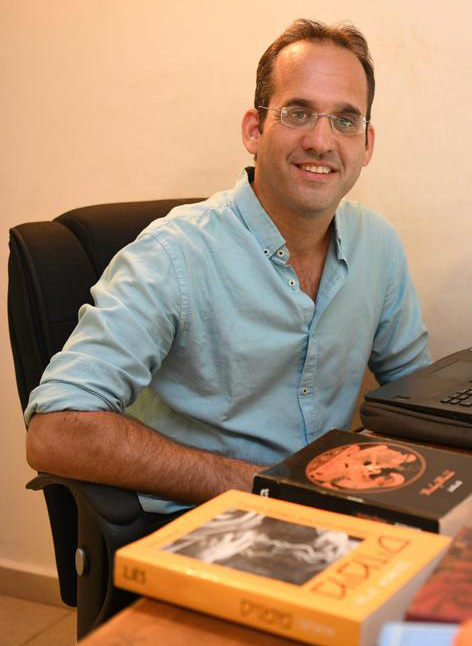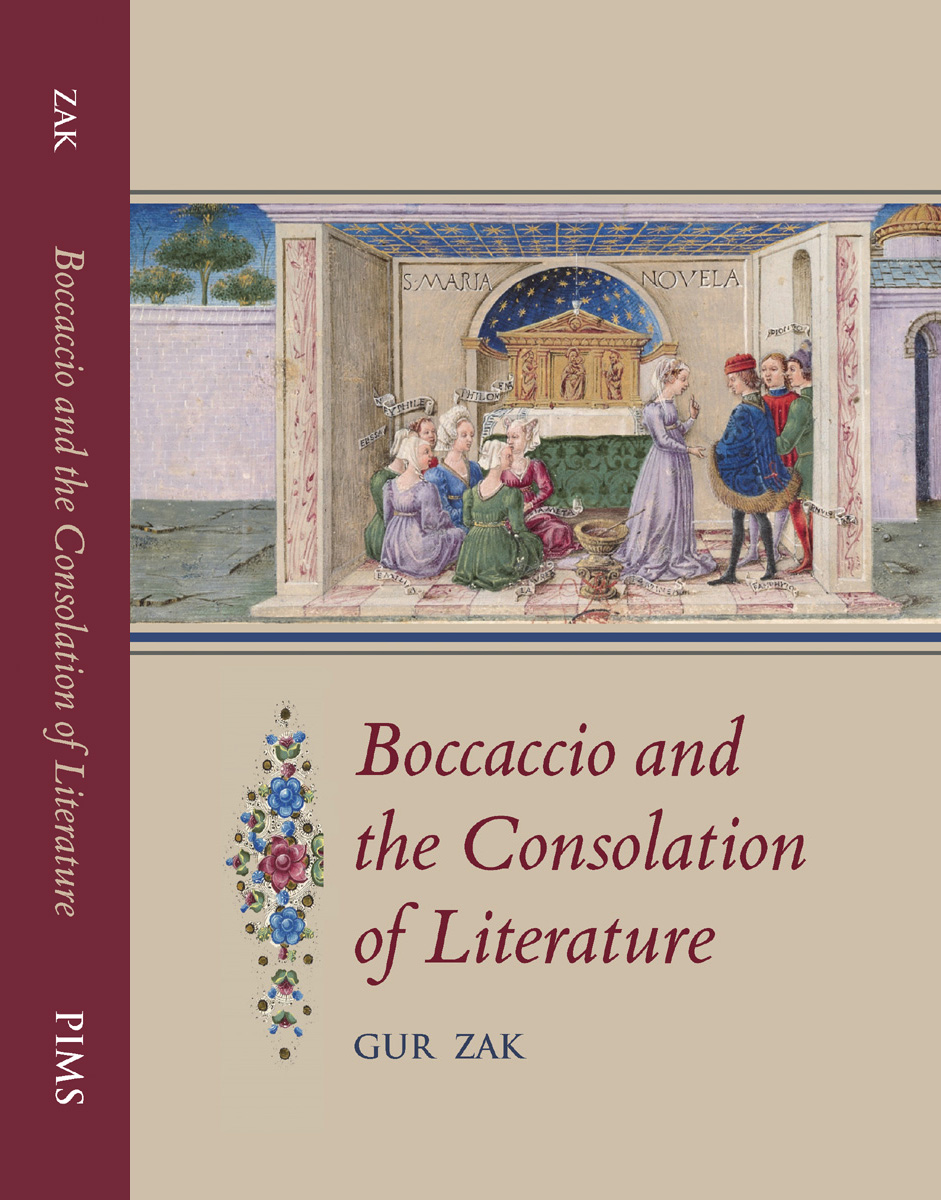
CMS Alumnus Gur Zak, Associate Professor of Comparative Literature and Romance Studies at the Hebrew University of Jerusalem, and Head of the Institute of Literatures, will give the 2023 CMS Alumni Lecture on April 14. Prof. Zak speaks to CMS Chronica about his interdisciplinary journey and his new book and research on consolation and compassion.
 What brought you to the Centre for Medieval Studies, and where has it led you?
What brought you to the Centre for Medieval Studies, and where has it led you?
My journey to the Centre for Medieval Studies began at the Department of History at Tel Aviv University, where I had a vague idea that I would like to pursue an academic career, but not sure in which field. I was captivated by Professor Aviad Kleinberg’s advanced seminar on “Mystical Movements of the Later Middle Ages” and his interdisciplinary approach to the study of history, particularly the way he brought together literature, philosophy, sociology, and anthropology in the study of medieval social movements. A graduate of CMS, Aviad advised me to contact his previous PhD supervisor, renowned medievalist Brian Stock. We clicked from the start, and I arrived in Toronto in the fall of 2001 to commence my graduate studies. I took a seminar with Brian on “Augustine’s Early Dialogues.” and read his book After Augustine: The Meditative Reader and the Text (University of Pennsylvania Press, 2001), and became interested in the ethics of reading, the medieval reception of the ancient tradition of spiritual exercises, textual communities, and ultimately Petrarch’s relationship to all this. This interest gradually developed into the topic of my dissertation as well as my first book, Petrarch’s Humanism and the Care of the Self (Cambridge University Press, 2010), and is the basis of my scholarly work to this day. Beyond the privilege of working with Brian, CMS was for me an ideal place due to its truly interdisciplinary nature. I came to the Centre as a history major and was offered here the opportunity to study the Middle Ages from a variety of disciplines and perspectives. I took courses in medieval philosophy, textual criticism, historical anthropology, and literature and literary theory – the discipline to which I was ultimately most drawn. This breadth of perspectives and approaches is undoubtedly one of the Centre’s greatest gifts to its students and one which I continue to cherish.
After graduating from the Centre, I was lucky enough to get a position at the Hebrew University of Jerusalem, where I teach in the Departments of Comparative Literature and Romance Studies and also serve as Head of the Institute of Literatures. In all my courses at the Hebrew U, I try to instill the interdisciplinary spirit upon which I was nurtured at the Centre, always thinking about medieval literature through its relationship with history, philosophy, and sociology. I learned at the Centre to always look for ways of bringing the Middle Ages into dialogue with the present without giving up in any way on careful attunement to historical context. It is this vigilant dialogue between past and present that I continually try to bring to both my research and teaching.
The Centre’s scholarly community, size, and reputation meant that I was able to study with an array of leading medievalists from a variety of fields including Suzanne Akbari, Lawrin Armstrong, Kenneth Bartlett, Deborah Black, the late Amilcare Iannucci (with whom I was lucky enough to study Dante), Brad Inwood, John Magee, Will Robins, Jill Ross, Nick Terpstra, David Townsend, and many more. I greatly benefitted from each and every one of those teachers, and I am truly grateful to all of them. Amidst a group of around forty or fifty fellow students from various corners of the world, we formed together a highly vibrant and cooperative scholarly community. I remember the six years my wife Dina and I spent in Toronto as one of the best periods of my life, and I am sure that the collegial and communal spirit of the Centre played a major part in that. In fact, I am currently editing with one of my fellow CMS students, Dr. Sarah Powrie, a volume of essays dedicated to our beloved mentor Brian Stock. In this volume will take part several other fellow graduates of the Centre from various periods, among them Catherine Conybeare, Aviad Kleinberg, and John Magee, alongside other luminaries such as Marcia Colish, Seth Lerer, Paul Saenger, Sarah Spence, Jane Tylus, and Natalie Zemon Davis. Beyond being a small token of gratitude to Brian, this volume is for me a testimony to the way the CMS continues to provide its graduates with a meaningful and supportive scholarly community long after graduation.
CMS was for me an ideal place due to its truly interdisciplinary nature. I took courses in medieval philosophy, textual criticism, historical anthropology, and literature and literary theory. This breadth of perspectives and approaches is undoubtedly one of the Centre’s greatest gifts to its students and one which I continue to cherish.
Congratulations on your latest book! What can you tell us about Boccaccio and the Consolation of Literature and how do you hope to inspire the reader?
 The book began in 2014 while on a visiting fellowship at Villa I Tatti, The Harvard Center for Italian Renaissance Studies at Fiesole. It has recently been published by the exquisite Toronto’s PIMS press, and I am grateful to their wonderful team of medievalists, especially the editor-in-chief Fred Unwalla, for their support.
The book began in 2014 while on a visiting fellowship at Villa I Tatti, The Harvard Center for Italian Renaissance Studies at Fiesole. It has recently been published by the exquisite Toronto’s PIMS press, and I am grateful to their wonderful team of medievalists, especially the editor-in-chief Fred Unwalla, for their support.
The question that interested and guided me when I began working on this book is the same which was on my mind when I was working on my first book, Petrarch’s Humanism and the Care of the Self, “why does literature matter?” A philologist at heart, I prefer to engage with this question historically rather than strictly theoretically and feel that this curious and fascinating triangle of Dante, Petrarch, and Boccaccio has something particularly meaningful to tell us.
In my work on Petrarch, I came to the conclusion that for him the reading and writing of literature are closely related to the ancient notion of “self-care,” that they function for him as a form of “spiritual exercise” in the sense developed by Pierre Hadot, Michel Foucault, and Brian Stock. I also contended at the time that the two literary corpora of Petrarch – the Latin and the vernacular – offer two distinct modalities of self-care, the first Stoically oriented and the second more Ovidian in nature – yet not without revealing overlaps between them. After I completed my book on Petrarch, I began a book on self-care in the Italian Renaissance, engaging in research on Alberti, Conversini, and others, publishing parts of this research as articles. But I constantly felt that something was missing – and that something was Boccaccio. How does Boccaccio relate to the value of literature? The more I engaged with Boccaccio’s works I came to realize that “self-care” is simply not on his mind. This term does not have the same currency and importance for him as it did for Petrarch, which is in itself interesting and points to an important difference in their appropriation of antiquity. Gradually, I came to the realization that when Boccaccio thinks about the value of literature, the term he has in mind is consolatio or the Italian consolazione, and therefore that a study of the value of literature in Boccaccio is essentially a study of the consolation of literature and the way he relates to the venerable medieval consolatory tradition.
Boccaccisti have, of course, long noticed Boccaccio’s interest in consolazione, but their engagement with this interest, in my view, was reserved almost exclusively to The Decameron and tended to identify Boccaccio’s vision of consolation with aesthetic pleasure, with the flight from the devasting reality of the plague to the pleasures of the text. There is no doubt some truth to this argument, but it only tells part of the story, as consolation was a significant concern for Boccaccio from the very beginning of his writing, continuing throughout, and because consolation involves for him much more than just passive pleasure and entails serious and quite groundbreaking philosophical and literary dimensions.
Boccaccio and the Consolation of Literature examines closely Boccaccio’s efforts at consolation in several of his works, his meta-literary reflections on the consolatory value of various literary genres, and his subversive dialogues with the revered medieval consolatory tradition. The book argues that Boccaccio developed in his works no less than a new vision of consolatio for the later Middle Ages, one that is empathetic to sorrow rather than critical of it, practical rather than abstract, and open-ended or “polyphonic” rather than authoritative and one-dimensional. His works tend to speak to the reader in multiple consolatory voices and in a manner that leaves to the reader the final choice as to how to use the work as a source of solace; different circumstances call for diverse solutions and there is no one universal solution to hardship. In developing these empathetic and polyphonic tendencies, Boccaccio was highly influenced by Aristotelian ethics, particularly the Aristotelian notion of practical wisdom and overall validation of emotions.
Demonstrating not only Boccaccio’s transformation of the medieval consolatory tradition, but also his engagements with consolation throughout the course of his long career, the book highlights points of divergences and continuities between the “early” and “late” Boccaccio. The striking similarities between Boccaccio’s early and later engagements with consolation led him to challenge Petrarch’s consolatory convictions in significant ways, offering thereby to future generations of humanists an alternative type of consolation to build upon.
I hope to enrich our understanding of Boccaccio as both an author and a thinker and to lead scholars to take him into serious consideration in any discussion of medieval and Renaissance consolatory literature. I also hope that this study will generate further interest in medieval consolatory literature and be of use to scholars interested in the relationship between ethics and literature.
Please tell us about your current projects and research.
Expanding on consolation, my latest research involves the emotion of compassion, a first step towards the offering of consolation, and according to Aquinas, itself a form of consolation. I am interested in broadening my research to questions of politics, community formation, and the civic uses of literature. Given the significant attention awarded to compassion in current discussions of political philosophy, cognitive psychology, the history of emotions, and the so-called “affective turn” in literary studies, I am very interested in bringing my work on late medieval compassion into a constructive dialogue with those fields, seeing what each of them can tell us about the other. Expanding on my already published articles dealing with the cognitive nature of compassion in Boccaccio’s Decameron, the differing attitudes of Boccaccio and Petrarch towards the ethical and civic value of compassion, and the way Leonardo Bruni appropriated the differing perspectives of his two predecessors in his novelle, I am interested in exploring how literary studies may contribute to the burgeoning field of the history of emotions, a connection that has not been sufficiently explored and theorized thus far.
In my current article-in-progress, “Dante’s Political Emotions,” I explore his representation of envy and compassion as civic emotions and his view of the role literature might play in cultivating constructive civic-oriented sentiments. A major part of my analysis involves the way Dante drew upon and modified theological and devotional approaches to compassion that were dominant in his day – both the affective-bodily approach common in Cistercian and Franciscan circles and the cognitive-Aristotelian one central to scholastic thinkers and preachers. My hope is to possibly extend this project through the Italian Renaissance up to Tasso.
Working on this project, I get the sense that much of current discussions of compassion, especially in literary studies, are deeply influenced by thinkers such as Bertolt Brecht and Hannah Arendt, and hence tend to concentrate on compassion’s partial and unreliable nature, its propensity to erect borders between in-groups and out-groups, us and them. It is therefore important for me to show how late medieval and Renaissance authors – from Dante to Tasso – presented a vision of compassion that, while perhaps imperfect in our current standards, opens up important avenues for extending one’s circle of concern in significant ways.
Teaching “After Dante: Renaissance Literature from a Global Perspective,” at the Department of Romance Studies at the Hebrew University, I discuss how medieval and Renaissance authors represented non-Christians, and it is striking for me to see how the wonderful, very diverse body of students – consisting of Israeli Jews, Israeli Arabs, and Palestinians from East Jerusalem – find in those texts a certain openness and “sympathy” that is far from obvious. This is of course most easily apparent in The Decameron, but they find traces of it also in Dante, Masuccio, Ariosto, and even Petrarch!
Beyond this project on compassion, I am also in the very early stages of another, tentatively entitled “Florentines in the Language of Grace: Dante, Petrarch, and Boccaccio in Hebrew Literature.” The uses of the Tre Corone in modern Hebrew Literature – both before and after the foundation of the state of Israel – is a topic that received only scant critical attention and I believe there is much to examine there. Engaging in this project is something that has been on my mind for a while now and perhaps it is the right time for me to turn to it.
We are so thrilled to hear you speak at the CMS Convivium in April; what are you looking forward to sharing with the audience?
Being invited to offer the alumni lecture is a great honour for me. It is highly exciting to return to discuss my work – which began right here at the Centre – with a new generation of students, as well as former teachers and colleagues. My talk will deal mainly with my new book and the way Boccaccio transformed in his works the Boethian consolatory tradition, but it will also incorporate some new material from my current project on the civic role of emotions and the dialogue I am trying to construct between literary studies and the history of emotions. Though this dialogue is only at its beginning, there are exciting new pathways to explore, and I hope to raise the students’ interest. More simply perhaps, I also wish to get the students excited about the Tre Corone – Dante, Petrarch, and Boccaccio – to examine the endless richness of their writings, the fascinating interactions between them, and their relevance to our present moment. Beyond that, I also wish to emphasize through my discussion of Boccaccio the significance to our society of humanistic studies in general, and literary studies in particular. Literature, as Boccaccio insisted, has the capacity to make our lives emotionally, intellectually, and spiritually richer, to re-connect us to the important things in life – those that reside beyond material gains and quantifiable data – and to play an important role in our civic engagements. At the same time, it is not only literature itself that has the capacity to do that, but also the studying and the teaching of it, and I hope that my talk will be able to convey this notion. If it will manage to achieve only a particle of that, then I will feel that I did my job.


